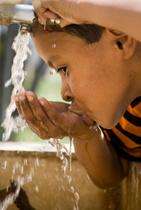Probing Question: Are drugs in our water harmful?

Some medications are so prevalent, people jokingly suggest they should be added to the water supply. OK, consider it done. Detectable levels of common pharmaceutical medications have been found in drinking water in the United States and Canada.
Public awareness of this issue spiked after a well-publicized 2008 Associated Press article, but researchers have known for decades that the drugs we throw away or put into our bodies wash out into the water supply, said Albert Jarrett, professor of biological engineering at Penn State.
"Technology has advanced so far that we can now detect things in our water that up until recently we were not able to detect," Jarrett said. "Ten or 15 years ago, we were happy to talk about parts per million; then it became parts per billion. Now it has become parts per trillion."
If there are minute traces of everything from antibiotics and birth control pills to pesticides and plastics lurking in your morning coffee, is that something you need to worry about? Scientists can’t say for sure yet, said Jarrett, but he believes "there is evidence we need to be concerned." He cites, as an example, the presence of estrogen-mimicking chemicals, called endocrine disruptors, in many of the toxins in our waterways. These chemicals been linked to changes in the sexual development of fish and other water life. For instance, in a study by the United States Geological Survey, more than 80 percent of male smallmouth bass in the Potomac and Shenandoah rivers were found to be growing eggs.
Is the appearance of hermaphroditic fish an early warning that humans will soon be facing health dangers?
Rachel A. Brennan, assistant professor of environmental engineering at Penn State, is researching a method to help remove contaminants from the water supply.
"It is now generally accepted that the average adult human does not have to worry for their own biological safety from endocrine disruptors in the water," Brennan said. But, she cautioned, "The concern is that developing children, particularly those still in utero, are more susceptible to these kinds of contaminants."
In a fact sheet released by Penn State's College of Agricultural Sciences, "Pharmaceutical Disposal and Water Quality," Jarrett and his co-author J. A. Clark, a Penn State extension educator in McKean County, Pennsylvania, write, "Today's municipal water and wastewater treatment systems do not intentionally remove these chemicals from the water and wastewater they treat, although a considerable portion of these chemicals are removed in the treatment processes."
It is generally acknowledged that more studies are needed to determine the effects, if any, the amount of drugs in drinking water may pose for the average adult. Two years ago, for example, participants in an Environmental Health Summit in North Carolina concluded that "Despite rising concerns about the presence of trace amounts of pharmaceuticals in drinking water, little evidence is currently available that associates these chemicals with adverse human health risks."
Brennan said she always likes to tell her audiences, "In the United States, our tap water is very safe," and that it is bottled water she recommends avoiding. Chemical compounds can leach out of plastic into bottled water, she said. Furthermore, bottled water is in many cases just bottled tap water. And the shipping, storage and disposal expenses associated with bottled water are wasteful.
So if you are worried about what's in your coffee, at least help yourself by making sure it is made with tap, not bottled, water. The latter, Brennan warns, "may actually contain more of these types of contaminants because it has been exposed to plastic for so long."
















